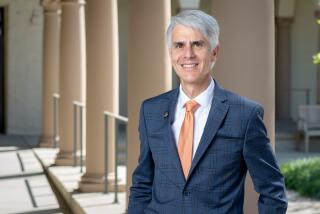PASSINGS: Charles Vest, Sam Barshop, Colin Wilson, Fred F. Scherer
Charles Vest
President of MIT
oversaw expansion
Charles Vest, 72, who as president of the Massachusetts Institute of Technology oversaw a vast expansion of the institution and inaugurated an unprecedented program of free online education, died Thursday at home in the Washington, D.C., area, according to the university. The cause was pancreatic cancer.
Vest was president of MIT from 1990 to 2004, and served on several high-level panels outside the university, including a State Department group that concluded in a 2005 report that the U.S. intelligence community was “dead wrong” in almost all its pre-Iraq war judgments about that country’s supposed weapons of mass destruction.
During his time as president of MIT, the school endowment grew from $1.4 billion to $5.1 billion, and its building program was so ambitious that when he left office, about a quarter of the school’s square footage had been constructed during his term. To help foster the growth, he strove to make strong alliances with industry and government agencies.
But Vest faced many problems common to scientific research institutions during that time, including a brain drain of student talent that chose Wall Street over science. “When you get right down to it, the bottom line is instant gratification,” Vest said in a 2002 Los Angeles Times interview. “Of course money has a lot to do with it. But I honestly believe the ability to see results happen so quickly is at least as big a factor.”
He embraced technology as a way to expand science education. By 2007 the school’s OpenCourseWare program, starting while he was president, had put teaching materials for more than 1,800 courses online, where they could be accessed at no charge.
Charles Marstiller Vest was born Sept. 9, 1941, in Morgantown, W. Va. He earned his undergraduate degree in mechanical engineering from West Virginia University, and his master’s and doctorate in the same field from the University of Michigan.
In a video-recorded interview with the BigThink site in 2007, he said his fascination with gadgets and science began as a boy. “A lot of it came from the fact that at the end of World War II, there was suddenly on the market all this amazing Army surplus equipment: microphones and headphones and radio components,” he said.
A friend’s father was a sheriff who raided gambling joints and gave disabled slot machines to the boys. “I got to tear it apart and get all the relays and components out of it.” Vest said. “Had a lot of fun like that.”
Sam Barshop
Co-founder of no-frills
La Quinta motel chain
Sam Barshop, 84, who co-founded the no-frills La Quinta motel chain, died Dec. 9 at home in San Antonio, Texas, according to the real estate development company Barshop & Oles, where he held the title of chairman emeritus. The cause was not disclosed.
Barshop was working for his family’s real estate firm in 1961 when the company built its first motel — a Ramada Inn, according to a Forbes magazine article. Motels were still seen as a sideline by the Barshops when they built two motels they called La Quinta in time for the 1968 HemisFair celebration in San Antonio. “We were going to build two hotels in San Antonio and that would be that,” Barshop told Forbes.
But the motels did well and offers poured in from property owners to build on their sites. By the 1980s, the company had more than 175 motels, about half of which were in Texas. Barshop, who ran the chain with his brother, Peter, kept consumer prices down by not offering much in amenities — most of the properties had no conference rooms or restaurants.
In the early 1980s the motels had about 80% capacity — far above the national average — but the recession of that decade hit the business hard. Barshop, as chairman and president, slowed expansion, but the stock price remained at a low ebb. Dissident investors mounted a corporate coup, and in 1992 a former Motel 6 executive was installed as president and chief executive.
Barshop went on to help form Barshop & Oles, which is currently involved in more than 2.5 million square feet of retail, industrial and mixed-used developments, according to the company website.
Samuel Edwin Barshop was born Sept. 11, 1929, in Waco, Texas. He earned a bachelor’s in business administration from the University of Texas at Austin and served in the Air Force from 1951 to 1954.
He was known for his charity work in the San Antonio area, donating to several Jewish organizations. In 2001 he also donated funds for a building at the University of the Incarnate Word a Catholic institution.
Colin Wilson
British author gained
fame with ‘The Outsider’
Colin Wilson, 82, a British author who gained fame with his first book, “The Outsider,” died Dec. 5 in Cornwall, southwestern England, where he had been hospitalized in October for pneumonia. Colin Stanley, Wilson’s publisher and bibliographer, said the writer and philosopher never fully recovered from a stroke in 2011.
The 1956 publication of “The Outsider,” a study of creative icons — including Vincent van Gogh, Franz Kafka and Friedrich Nietzsche — that espoused a brand of existentialist individualism, catapulted the writer to fame.
Orion Publishers described it as “a study of alienation, creativity and the modern mind.”
The book was hailed as the debut of a major new thinker, though a backlash soon followed from critics who sensed something sinister in Wilson’s lionizing of individualism.
Nothing else Wilson wrote achieved the same level of success, though he went on produce more than 150 books, exploring his interest in serial killers, extraterrestrials and the occult.
His nonfiction books about crime and the paranormal — including “The Occult: A History” — and horror and science fiction novels such as “The Space Vampires” gained him a cult following.
Wilson was born June 26, 1931, in Leicester and held various jobs while working on the manuscript that would become “The Outsider.”
Fred F. Scherer
Painter created
vivid dioramas
Fred F. Scherer, 98, a painter who created vivid dioramas of animals and birds in natural scenes for the American Museum of Natural History in New York City, died of natural causes Nov. 25 in Townshend, Vt. His daughter Deidre Scherer, also an artist, announced his death.
Scherer was born in New York in 1915 and learned from his mentor, artist James Perry Wilson, how to paint dioramas, three-dimensional scenes that convey sense of place and time of day and create the illusion of being at a specific location.
From 1934 to 1972, he created or collaborated on many dioramas in the natural history museum. He created at least 15 of them in the Chapman Memorial Bird Hall, the African Hall and the North American Mammal Hall, his daughter said.
Scherer, who was curious about the natural world, sometimes would travel to paint in the field, said fellow artist Stephen Quinn, who worked at the museum after Scherer retired.
“As time goes on, natural history museums with these wonderful works really will be recognized as the great art museums that they really are,” said Quinn. “These exhibits predated sophisticated film and photography, so this was the medium chosen by scientists to teach natural history. So they’re really like the first form of virtual reality.”
Quinn said the purpose of the dioramas wasn’t to teach facts but to connect with the emotional response people have to nature and that Scherer “could do that with his paintings.”
After Scherer retired from the museum, he and his wife, artist Cicely Aikman, lived in Friendship, Maine, for 32 years. He continued to paint and draw into his final days, his family said.
Kate Williamson, 82, a character actress who appeared in such films as “Disclosure,” “Dahmer,” “Dream Lover” and “Racing With the Moon,” died Dec. 6 at her Encino home after a lengthy illness, said her manager, Judy Fox.
Williamson, who also appeared in dozens of TV shows dating to the 1970s, died less than a month after the death of her husband of nearly 60 years, veteran character actor Al Ruscio. “They were the epitome of true and forever sweethearts,” Fox said.
Times staff and wire reports
More to Read
Start your day right
Sign up for Essential California for the L.A. Times biggest news, features and recommendations in your inbox six days a week.
You may occasionally receive promotional content from the Los Angeles Times.






